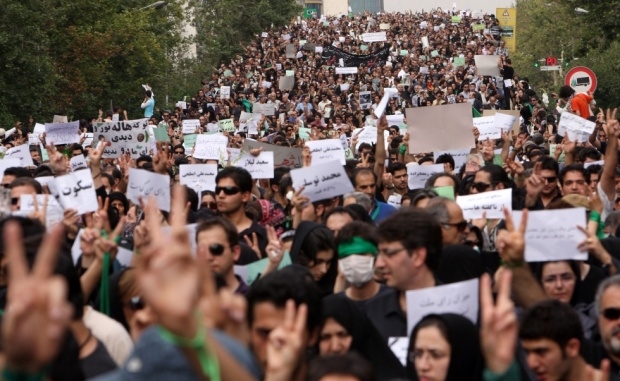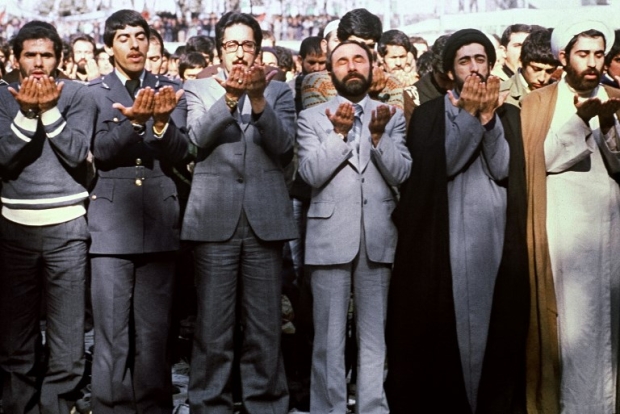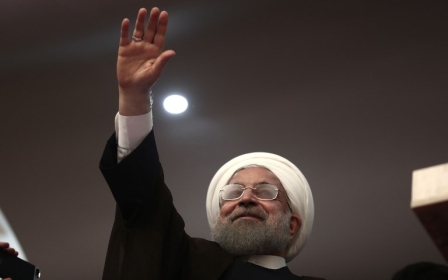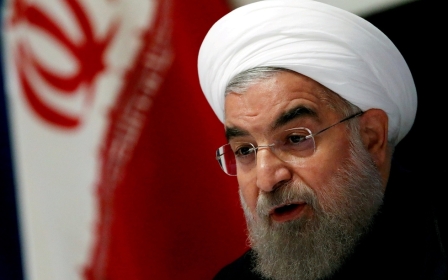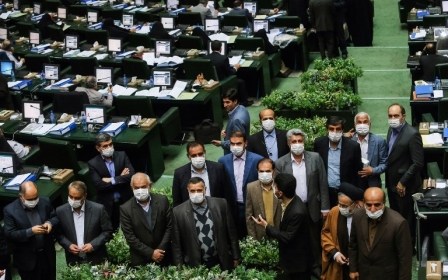Why Rouhani is not untouchable
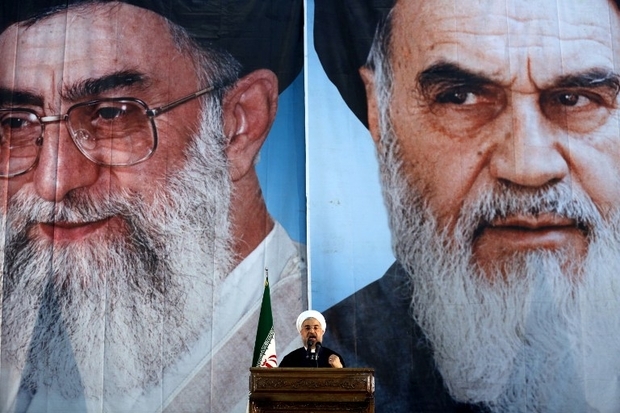
In his opinion piece for Middle East Eye earlier this month, Mahan Abedin argued that the intensity of the conservatives' campaign against Iran's centrist president "should be analysed in the context of the Islamic Republic's consensual institutional approach to strategising and policy making as opposed to a concerted campaign to marginalise Rouhani".
"At any rate," he added, "the Iranian president has sufficient electoral and institutional support to serve his second term in full."
Abedin points to "Rouhani’s landslide victory" in May's presidential elections, his "reformists' formidable grassroots base," and his "wider electoral base" as reasons why he is "far removed" from the situation faced by Iran's first president, Abol Hassan Banisadr, who was ousted by the conservative current in 1981.
Certain caveats are in order.
First, of the 41 million votes cast in the May election, Rouhani won 23 million while his conservative opponent, Ebrahim Raisi, received 16 million.
But if you compare Rouhani's votes to the 22 million that the reformist Mohammad Khatami attracted in 2001, out of only 28 million votes cast (there were 20 million fewer eligible voters at the time compared with this year), his victory is by no means a landslide. In fact, it means that the reformists and moderates were barely able pick up new voters despite the increase of 20 million eligible voters.
Second, although it depends on how one interprets the strength of the reformist forces behind Rouhani, which Abedin describes as "formidable," this grassroots base cannot save Rouhani if conservative forces decide that he must be removed.
Polarised society
The massive upheavals of 2009 under the banner of the Green Movement, which protested against the re-election of the eccentric president Mahmoud Ahmadinejad, are a glaring example that those forces can be squelched and its leaders can be jailed or put under house arrest for an indefinite period with no serious consequences for the deep state.
It is true that Rouhani enjoys a large base, but he cannot push his agenda to the point that it threatens the ideals and interests of the opposing camp
The 2009 protests made no economic demands, suggesting that the uprising was a civil rights movement and its backbone – like Rouhani's main political base today – consisted of the middle- and upper-middle class. Their worldview supports modernism - including secular liberals and religious liberals - and opposes the imposition of strict Islamic codes and thus the conservative rule and worldview.
This part of society – which, based on several elections including this May's, could be said to be the majority – does not simply face resistance from the security-military apparatus and the police forces as many Iran experts mistakenly suggest. It is also fiercely opposed by the conservative faction within Iran's "fragmented society," the term used by the Iranian sociologist Ramin Jahanbegloo, that is also significant and cannot be ignored.
These social forces are present at all levels of society, from governmental offices, to schools, to universities, to industrial complexes. In the case of any upheaval by their opposing camp, they - especially youth vigilante groups - counter by using force and large demonstrations. They obviously have the support of the security apparatus, the Revolutionary Guard (IRGC), and the police.
Simply put, it is true that Rouhani enjoys a large base, but he cannot push his agenda to the point that it threatens the ideals and interests of the opposing camp by relying on the social forces that support him.
Rouhani's evolution
Rouhani, who was previously known as a moderate, has now completed his metamorphosis into a reformist. He attacks the strongholds of the deep state from the IRGC, to the Guardian Council, to the judiciary, to the police forces.
Rouhani's remarks during the election were outspoken enough that they could result in a sentence of years in prison. In an 8 May speech during his campaign, he said: "[In the upcoming election] the people of Iran will once again announce that they don't accept those who only knew of the executions and imprisonments for 38 years."
He was not only clearly targeting his rival Raisi, who, until a year ago, was a high-ranking member of the judiciary, but the judiciary system as a whole, which is under the direct supervision of the supreme leader.
Rouhani has constantly criticised the IRGC in his public speeches. He recently referred to the IRGC as dominating the country's key economic sectors, remarking that "part of the economy was in the control of a government without a gun. [During Ahmadinejad] we gave it to the government with a gun".
Mohammad Ali Jafari, the IRGC commander, blasted Rouhani's remarks and emphasised that while the IRGC is the main guarantor of Iran's security and stability, "unfair attacks on the IRGC pursue other purposes [than simple critiques]. We choose silence only to maintain unity [within the country]".
The 10 July issue of the weekly Sobhe Sadeq, the political organ of the IRGC, is filled with assaults on Rouhani and his administration. To understand the extent of the current friction, one only need read a featured article, "The suspicious scenario of destroying the IRGC inside [the country]." It asserts that the newspapers that "are supported by the reformists and the incumbent administration" have possible connections with "foreign enemies". The article requests that the security system investigate the matter.
Popularity is not enough
Abedin contends that Banisadr's example is not applicable to Rouhani because he did not have "the popularity to rally the masses. His victory in the Islamic Republic's first presidential election in January 1980 was largely a result of his close association with Ayatollah Khomeini than any outstanding personal or political trait."
Banisadr's problem was not a lack of popularity. It was his counting on his popularity in his conflict with the deep state supported by the conservative faction of the society. This is exactly the mistake that Rouhani is on the road to make. It also explains why, 36 years after Banisadr's ouster, Khamenei warns Rouhani that his political path will end the same way as Banisadr.
Deep state
Abedin is correct regarding the composition of the parliament, which is now pro-Rouhani. But attention should be paid to the faction that has tipped the balance of power in favour of Rouhani: the "Independent Followers of Velayat," which refers to the followers of Khamenei. While this faction may support Rouhani on day-to-day issues, there is little doubt that the group would prefer a deep state led by Khamenei, rather than Rouhani.
To understand how the system works when it comes to sensitive moments, it suffices to take a look at the events that occurred in 2000, when the administration was reformist and the parliament was dominated by reformists – the best scenario that could happen for a reformist president. Notwithstanding this favorable political climate, Ayatollah Khamenei stunned reformers by banning a new bill restoring freedom of the press, which then president Khatami submitted to the parliament.
Will Rouhani be ousted? Not if he changes course and ceases his attacks on conservative strongholds. But if he continues his current aggressive approach in the hope of pushing them back by relying on his popularity, he may very well face a fate similar to Banisadr's.
- Shahir Shahidsaless is an Iranian-Canadian political analyst and freelance journalist writing about Iranian domestic and foreign affairs, the Middle East and US foreign policy in the region. He is the co-author of Iran and the United States: An Insider’s View on the Failed Past and the Road to Peace. He is a contributor to several websites with focus on the Middle East as well as the Huffington Post. He also regularly writes for BBC Persian. You can reach him at [email protected] or follow him on Twitter @SShahisaless.
The views expressed in this article belong to the author and do not necessarily reflect the editorial policy of Middle East Eye.
Photo: Iranian President Hassan Rouhani delivers a speech under portraits of Iran's supreme leader, Ayatollah Ali Khamenei (L) and Iran's founder of the Islamic Republic, Ayatollah Ruhollah Khomeini (R), on the eve of the 25th anniversary of the Islamic revolutionary leader Ayatollah Ruhollah Khomeini's death, at his mausoleum in a suburb of Tehran on 3 June 2014 (AFP).
New MEE newsletter: Jerusalem Dispatch
Sign up to get the latest insights and analysis on Israel-Palestine, alongside Turkey Unpacked and other MEE newsletters
Middle East Eye delivers independent and unrivalled coverage and analysis of the Middle East, North Africa and beyond. To learn more about republishing this content and the associated fees, please fill out this form. More about MEE can be found here.



